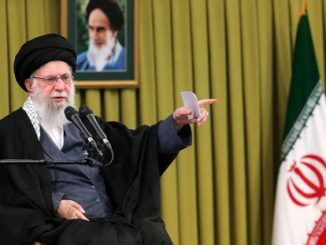
| Published April 5, 2025
Trump administration hopes Tehran will agree to broad concessions in accelerated negotiations, say press reports
The Trump administration is pursuing direct negotiations with Iran to achieve the complete dismantling of Tehran’s nuclear program, aiming for a more comprehensive agreement than the 2015 nuclear deal. President Trump emphasized the efficiency of face-to-face discussions and expressed confidence in Iran’s interest in such talks. While Iran has not officially responded, indications suggest openness to indirect talks, with potential for direct negotiations in the future. The U.S. has set a two-month deadline for reaching an agreement, seeking a total halt to Iran’s uranium enrichment activities. In parallel, the U.S. has increased its military presence in the Middle East as a precautionary measure.
President Trump said he would hold Iran responsible for any future attacks by the Houthis in Yemen after the U.S. launched strikes against the U.S.-designated terrorist group. Photo: U.S. Navy/Zuma Press
IMPLICATIONS
Here are the implications of the U.S. seeking direct talks with Iran to fully dismantle its nuclear program:
1. Diplomatic Shift
-
This move signals a shift from maximum pressure to direct diplomacy, suggesting the U.S. is open to negotiation rather than solely relying on sanctions or isolation.
-
If successful, it could ease tensions in the Middle East and potentially stabilize U.S.-Iran relations.
2. Pressure on Iran
-
The two-month deadline and demand for full dismantling increase pressure on Iran to comply or face further diplomatic or economic consequences.
-
Iran may leverage this situation to gain sanctions relief or economic incentives.
3. Regional Security Concerns
-
Neighboring countries, especially Israel and Gulf States, will closely monitor the talks, as any outcome affects regional power dynamics.
-
A failure in talks could escalate tensions, especially with increased U.S. military presence in the region.
4. Political Impact in the U.S.
-
A successful deal may strengthen the administration’s foreign policy credentials.
-
However, critics might argue that such talks legitimize the Iranian regime or deviate from earlier tough-on-Iran stances.
5. Impact on Global Non-Proliferation
-
A deal that dismantles Iran’s nuclear program would reinforce global non-proliferation norms.
-
On the flip side, Iran’s refusal or breakdown of talks could embolden other countries to pursue nuclear capabilities.
OVERALL TAKEAWAY
The U.S. push for direct talks with Iran marks a strategic shift toward diplomacy aimed at completely ending Iran’s nuclear ambitions. While it opens the door for potential de-escalation and a stronger non-proliferation stance, it also carries risks—heightened tensions, regional unease, and political consequences if the talks fail. Success would be a major foreign policy win; failure could deepen instability.





Be the first to comment